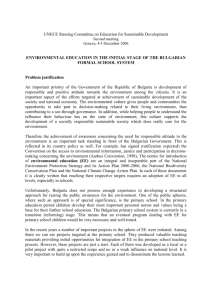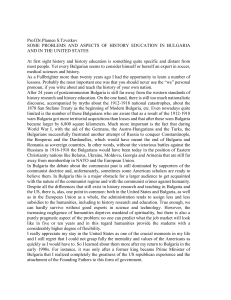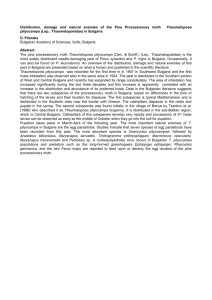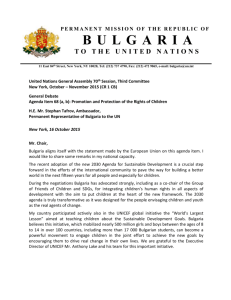Danubian review - Vol. 8. No. 6. (November 1940.)
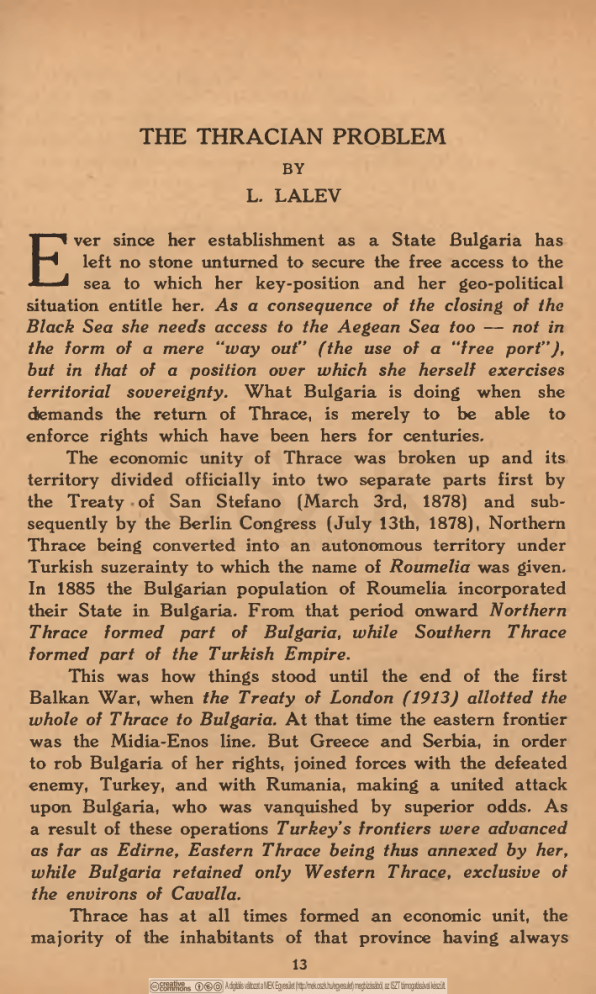
THE THRACIAN PROBLEM
B Y
L. LALEV
E ver since her establishment as a State Bulgaria has left no stone unturned to secure the free access to the sea to which her key-position and her geo-political situation entitle her. As a consequence of the closing of the
Black Sea she needs access to the Aegean Sea too — not in
the form of a mere “ way out” (the use of a “ free port” ),
but in that of a position over which she herself exercises
territorial sovereignty. What Bulgaria is doing when she demands the return of Thrace, is merely to be able to enforce rights which have been hers for centuries.
The economic unity of Thrace was broken up and its territory divided officially into two separate parts first by the Treaty of San Stefano (March 3rd, 1878) and sub sequently by the Berlin Congress (July 13th, 1878), Northern
Thrace being converted into an autonomous territory under
Turkish suzerainty to which the name of
R o u m e l i a
was given.
In 1885 the Bulgarian population of Roumelia incorporated their State in Bulgaria. From that period onward
N o r t h e r n
T h r a c e f o r m e d p a r t o f B u l g a r i a , w h i l e S o u t h e r n T h r a c e f o r m e d p a r t o f t h e T u r k i s h E m p i r e .
This was how things stood until the end of the first
Balkan War, when the Treaty of London (1913) allotted the
whole of Thrace to Bulgaria. A t that time the eastern frontier was the Midia-Enos line. But Greece and Serbia, in order to rob Bulgaria of her rights, joined forces with the defeated enemy, Turkey, and with Rumania, making a united attack upon Bulgaria, who was vanquished by superior odds. As a result of these operations Turkey’s frontiers were advanced
as far as Edirne, Eastern Thrace being thus annexed by her,
while Bulgaria retained only Western Thrace, exclusive of the environs of Cavalla.
Thrace has at all times formed an economic unit, the majority of the inhabitants of that province having always
13
DANUBIAN REVIEW been Bulgarians. During the whole course of her history
Bulgaria has never ceased to insist on having access to the
Aegean Sea. Bulgaria at all times respected the international significance of Byzantium and endeavoured to maintain friendly relations with that Power. It was from Byzantium that she received Christianity; and for that reason she never
formulated any claim to the Dardanelles, her aspirations
being limited to a desire to create a united State by a union
of all the Bulgarian elements. The direction of the life of
Thrace as a whole has in any case at all times been in the hands of the Bulgarians, — without doubt, economically, if not politically too. From the reign of Assen II. the southern frontier of the Bulgarian State was the Aegean Sea, though
Bulgaria had to fight for the possession of Thrace, first with
Byzantium and later on with the Turks. Subsquently, as a consequence of the mistaken policy of Byzantium, the Turks were enabled to conquer both their rival, Byzantium, and
Bulgaria, who was driven to defend herself. The latter country suffered enormously, but neither did the Turks succeed in their policy of turkisation nor did the Eastern
Church prove able to grecianise that country. Even according
to the Turkish Census of 1870, in Southern Thrace, which
belonged to the Bulgarian Exarchate, there were 267.800
Bulgarians as against 185.900 Greeks and 70.800 Turks.
The Bulgarians were exposed to indescribable sufferings; for the defended their national existence against all attempts to suppress it: and after the overthrow of the
Bulgarian insurrection of 1876 the Turks destroyed 35
villages and massacred 12.000 Bulgarians, crowning these atrocities by executing the "insurgent leaders" in the most inhuman manner. According to the British Blue Book of
1878, the Turks drove away from the environs of Chorbu
alone 23.000 Bulgarians, 18 villages being here too destroyed
by fire. It was these monstrous deeds of barbarity that sowed the seeds of the insurrection of 1903 and led subsequently to the first Balkan War, which was due to the initiative of the Bulgarians.
B u t u n t i l t h e e n d o f t h e f i r s t G r e a t W a r n o o n e h a d e v e r d i s p u t e d t h e B u l g a r i a n s ’ r i g h t t o W e s t e r n T h r a c e .
The
Entente Powers too at first merely subordinated that terri
14
THE THRACIAN PROBLEM tory to their own control. A t that time the population of this territory — according to the Census made by these
Powers — included 80.893 Bulgarians, 73.220 Turks and
51.706 Greeks; but these figures were incorrect, for according to the Bulgarian statistical data the inhabitants of this territory in reality included 146.648 Christian Bulgarians and 96.400 Mohammedan Bulgarians. Until the Paris
Treaties of Peace were drafted Greece had never laid claim to Western Thrace; indeed, even after the second Balkan
War Bulgaria's right to that province was acknowledged.
And, on May 13th, 1916, Venizelos himself, speaking in the
Greek Parliament, declared Greece's desinteressement in respect of Thrace. A t the peace conference following the first
Great War the American Delegation supported the claim of
Bulgaria; but Great Britain was anxious to do Greece a
favour, the result being that the Conference was reluctantly
compelled to decide to leave Thrace under the control of the
Great Powers: and it was only after the Peace Conference,
when America had ceased to exercise any influence, that
Great Britain succeeded in enforcing her will and in getting
Western Thrace allotted to Greece.
From the territory thus allotted to Greece the Greeks
— for “ strategic reasons’ — transferred nearly 100.000
Bulgarians to the Greek islands, conveying them thither in
barges; many of the Bulgarians thus deported never reached
their new homes, while many others perished of hunger on
the bleak islands. The more fortunate inhabitants succeeded in escaping to Bulgaria, while those who remained in Western
Thrace were exposed to the vindictive measures of the Greek regime. Finally, in 1924, even the Entente Powers became disgusted with the conduct of the Greeks and forced the
Greek Government to conclude with them a minority protec tion agreement. And the Bulgarian Government, in order to alleviate the sufferings of their racial kin, provided for the transfer to Bulgaria of a part of the Bulgarian population.
The population continually protested against the measures of the Greek regime and rose in insurrection; but neither this action nor the complaints submitted to the
League of Nations proved able to secure the hardtried people of this territory the justice to which it was entitled. Even
15
DANUBIAN REVIEW
“ Le Temps" repeatedly entered the lists in defence of the rights of the Bulgarians and showed that the Greeks had no
claim to the territory in question; but these articles also failed to achieve any result. Nor was any provision made to
ensure Bulgaria real and unimpeded access to the Aegean,
though this had been one of the provisions included in the
Treaty of Neuilly (Article 48). And the proposals made by
Greece in this connection were unacceptable to Bulgaria.
Bulgaria did not renounce Thrace in favour of Greece even when signing the Treaty of Neuilly; for she believed that in order to ensure peace in the Balkans the Entente would re-instate her in her lawful possession of this territory.
But the Entente failed to do so. And, now that a new order based upon reason and justice is in process of formation also in the southern half of the Balkan Peninsula, nothing could be more natural than that the Thracian problem should also be adjusted in keeping with the legitimate demands of
Bulgaria and with the postulates of economics and of the geo-political situation. Under Bulgarian rule, by the help of
adequate investments and a rational adjustment of the
problem of irrigation, Thrace may be converted into one of
the most fertile areas of Europa; but as things stand at present, cut into pieces by absurd frontiers, that territory is unhappy and incapable of development. Thrace must therefore be allotted to Bulgaria; for — apart from historical, geo graphical and ethnographical considerations — this is the course prescribed by economic considerations too: for it is only as a united territory and on the basis of a uniform scheme that the production of Thrace can be increased to a level advantageous to the general interests of the European community of peoples.
16
